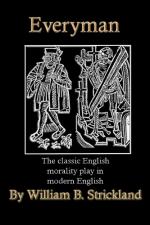|
This section contains 346 words (approx. 1 page at 400 words per page) |

|
Everyman is a morality play that first appeared in England early in the sixteenth century. The author is unknown, but it has been speculated by scholars that the play was written by a cleric or under the direction of the church. It is now thought to be based upon a Dutch play, Elckerlijk ("Everyman"), written in 1495 by Petrus Dorlandus, a Carthusian monk. Four copies of the sixteenth century editions of Everyman still survive, with all four published between 1510 and 1535. Although the author is unknown, the play's content, themes, and ideology reflect those of Catholic Europe. The play's emphasis on good deeds as a mechanism for salvation reflects medieval Catholic ideology.
The use of Christianity as a topic and a force behind theatre reflects a significant change from Christian opposition to early drama. Traditionally, the Catholic Church opposed the theatre because it frequently included nudity, fights with...
|
This section contains 346 words (approx. 1 page at 400 words per page) |

|




